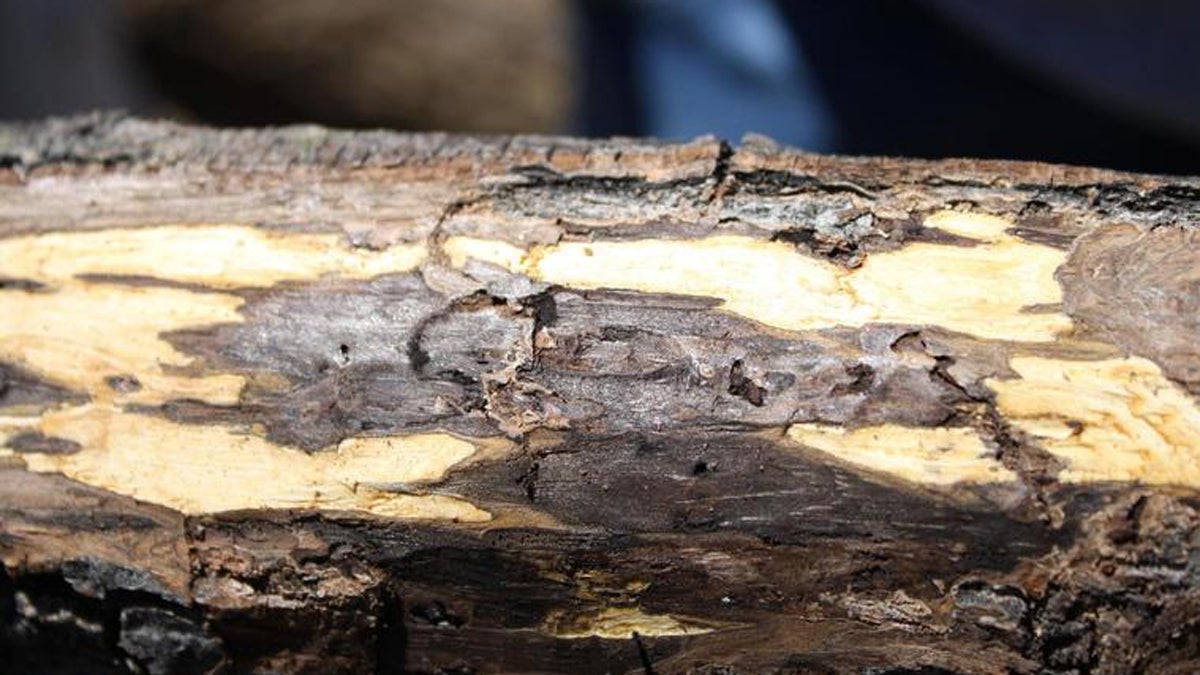Thousand Cankers Disease prompts wood quarantine in Pa.
Listen
Thousand cankers disease makes its mark on black walnut trees. (Photo courtesy of Grant Jones)
Caused by a fungus that’s transported by the walnut twig beetle, the disease attacks the innermost layer of a tree’s bark, called the phloem.
The forests of Pennsylvania’s northern tier produce the kinds of wood that are favorites for beautiful furniture and front doors, such as cherry, oak and walnut.
Unfortunately, pests love them too. Pennsylvania’s horticultural history seems to include a steady stream of insects and fungi that threaten this major industry (recall the chestnut blight and Dutch elm disease).
Now, even as Pennsylvania grapples with the latest scourge of the Emerald ash borer, a new pest has arrived on our doorstep.
It bears the ominous name of Thousand Cankers Disease. Caused by a fungus that’s transported by the walnut twig beetle, it attacks the innermost layer of a tree’s bark, called the phloem.
“When the beetle bores into the tree, into the phloem, that canker will start under the bark,” said Chris Miller, an arborist with Davey Tree Experts in King of Prussia . “The phloem is what’s bringing all the nutrients of the tree, from the top down. It basically shuts down the vascular system of the tree.”
On a recent outing in Chester County, Miller pointed out an example of the intended victim of Thousand Cankers Disease: a stately black walnut tree.
“The walnut is identified by its leaf,” said Miller. “Specifically, it has what’s called a compound leaf – meaning it’s got a bunch of leaflets coming off of one leaf. It also has a very pronounced nut. It makes quite a racket on your roof or your car if you’re parked under it.”
Thousand Cankers Disease was identified in Bucks County a couple of years ago. Last week, after a sighting in Chester County, the Pennsylvania Department of Agriculture issued a quarantine for the five-county Philadelphia region. In an attempt to contain the disease, the quarantine prohibits the exporting of black walnut trees, lumber and firewood from Philadelphia, Bucks, Delaware, Montgomery and Chester Counties.
The walnut twig beetle is known to travel about two miles per year. Now, the Philadelphia region is a long way from the state’s huge forests along its northern tier. But Pennsylvania is the leading producer of hardwoods in the U.S., so any threat to its forests is alarming. Closer to home, Thousand Cankers Disease is particularly devastating to a smaller industry.
“Historically, it ranks right behind mahogany as a quality wood” said John Struble, a woodworker who specializes in custom-designed furniture. “Whether it’s a credenza, table, or chairs, it’s just phenomenal.
In his Philadelphia workshop, as an assistant sands down a work-in-progress, Struble points out some of black walnut’s highlights.
“This is what it looks like and when you put a stain on it and put a varnish on it, it gets a nice golden brown,” he said. “This is what people love on their door panels and stuff like that.”
No easy fix
There’s no remedy for the tree once it’s infested. In the case of lumber, the wood gets dried in a kiln, which prepares it for a woodworker and also kills any pests. But other uses for the untreated wood can spread the problem, so Pennsylvania officials have resorted to the quarantine. John Struble worries whether it’s possible to get the word out to everyone who needs to know.
“The lumber yards that deal in walnut to woodworkers like myself, they already know what the deal is,” Struble said. “Then they run it through a kiln and it’s safe. But the guys that just cut walnut for firewood, and then decide to take it down to another place, you know, from one county to another, there might be a problem with that, and there’s no way to regulate that.
Arborist Chris Miller agrees that a quarantine is not a foolproof solution.
“The quarantine, unfortunately, we’re at the mercy of people understanding the importance of quarantining woods, like the walnut trees here, and not moving them for firewood to another location, or cutting them and taking them to another part of the state or other states,” he said.
The Pennsylvania Department of Agriculture’s quarantine has been issued for an indefinite period of time. You can get more information from your County Cooperative Extension Office or the Invasive Species Hotline at Badbug@pa.gov.
WHYY is your source for fact-based, in-depth journalism and information. As a nonprofit organization, we rely on financial support from readers like you. Please give today.



